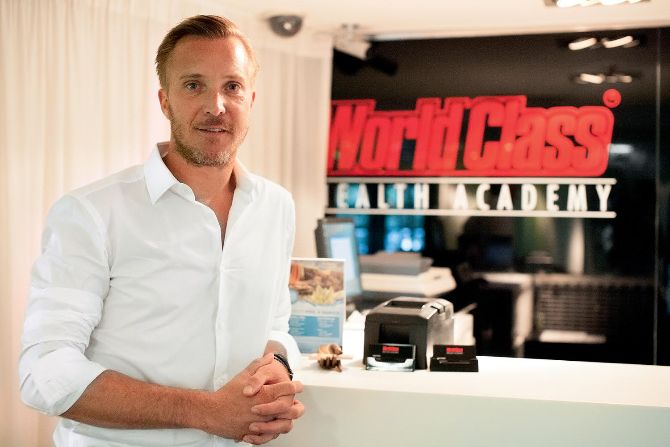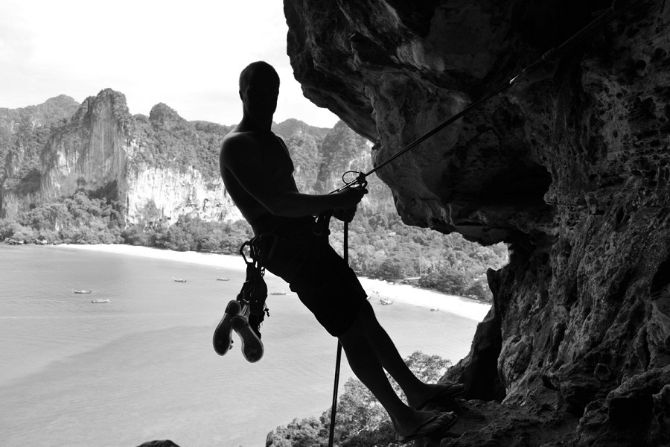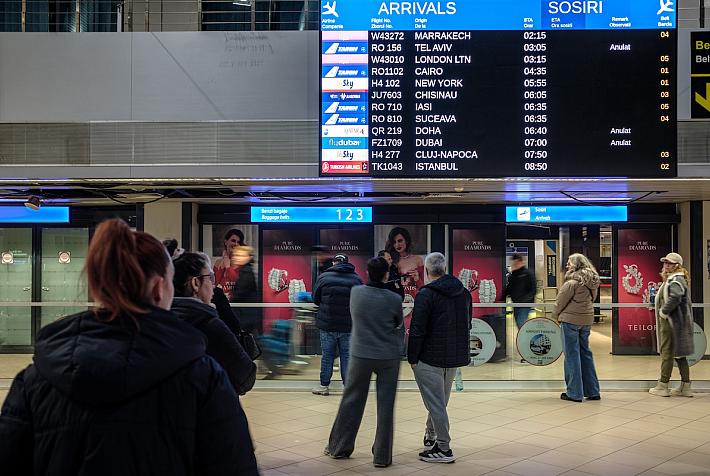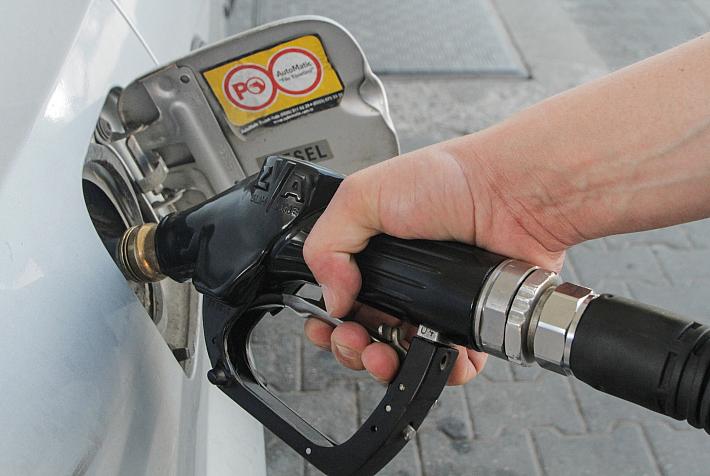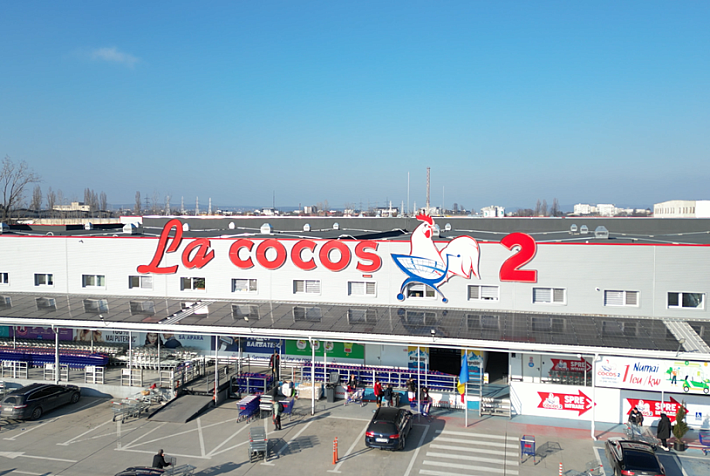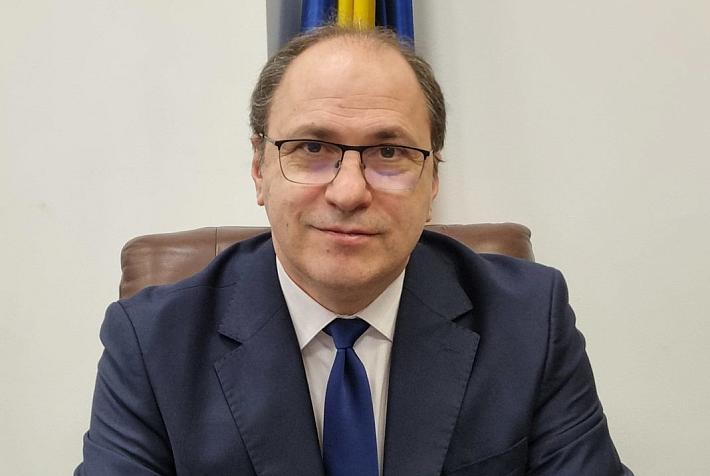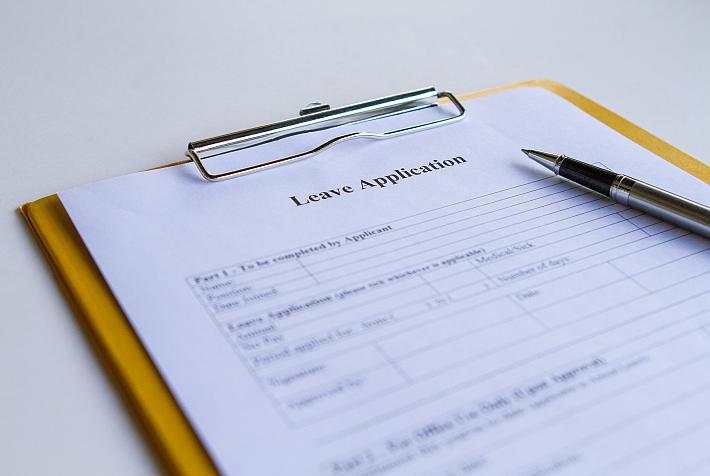Rock climber Mikael Fredholm’s biggest challenge

For passionate mountaineer and rock climber Mikael Fredholm the biggest climb of his life is just beginning. He has climbed his Omu Peak* starting as just another employee of World Class Romania, ten years ago, and managed to become CEO of the whole group. Now he’s starting a new, much more difficult ascent: his Everest, as a manager and an entrepreneur, aiming not only to turn his company into the largest company in Romania’s fitness industry, but also to leave a mark and change the lifestyles of millions of Romanians.
It’s a big undertaking, but no challenge is too big for Mikael, who takes on business using the same principles which help him in rock climbing, one of his biggest passions: set a goal and then do what it takes to reach it.
“Anyone can accomplish anything. It’s not about talent or strength, it’s all about determination and not giving up. And that’s climbing, you don’t have a choice, you can’t give up, because then you get stuck on a mountain. So you really have to push your mind to accomplish it, because giving up is not an option,” Mikael Fredholm says.
Mikael is not the tall heavy guy you expect him to be, as a descendant of the mighty Vikings, although he’s training in the gym almost every day. But he’s slim, full of energy and always ready to take on new challenges. You can see his energy in his eyes. It’s not hard to imagine him climbing a 200-meter high cliff with just his hands and feet and a piece of rope. It’s not hard to see him growing a company either. Especially if that business is something he truly believes in.
“I’m very lucky. I absolutely like my job. And in a way, good or bad, for me work and job are very connected. The job is part of my lifestyle and I’m very happy to work in the fitness industry,” he says.
It hasn’t always been easy for him and it took a while before he found out his passion and his mission were. It was a long journey and a series of unexpected events which brought him to where he is today: CEO and co-owner of the largest fitness business in Romania.
A series of unexpected events
He was born near Sweden’s capital Stockholm, but like great Viking explorers before him he quickly realized that he wanted to see more of the world. So, at 17, he went to the U.S. as an exchange student in Phoenix, Arizona. Then he returned to the U.S. to attend the University of Denver, Colorado, for five years, on a golf scholarship.
After that he moved to the Netherlands for a management trainee program in Amsterdam. It was supposed to take three years, but after one year a friend called him from Sweden and told him he wanted to develop a management consulting company for mobile internet. At that time, mobile internet was one of the hottest things. It was just before the dot com crash.
So he went to Stockholm and joined this management consultancy company as employee number seven. In 12 months they already had 40 consultants. Then the dot com bubble burst and they went out of business in six months. It was the first major unexpected event of his life. “It was a very cool experience. From building up a company in a very hot industry and then going broke in six months,” he recalls.
He left Sweden again to work for an investment company in the Middle East. They worked in Saudi Arabia, Jordan and Egypt mainly, building pharmaceutical plants in the desert. “It was very demanding. I was traveling 250 days per year. Besides the difficult culture, it was hard to build pharmaceutical plants in the middle of nowhere.” So after three years of doing this, he was looking for a change.
It was around that time he met the owner of the World Class fitness club business for lunch in Stockholm. “He offered me a job for World Class. I thought he said I would work in Budapest. So I shook his hand and accepted the job. When he sent me the plane ticket two weeks before I was going to start, they were for Bucharest. So I called him and said: Ulf, I think you bought the wrong tickets. I thought I was going to Budapest! And he said: no, Bucharest! So I said - fine, I’m going to Bucharest!”
It was the second unexpected moment, and it changed his life forever. Dropped in a foreign country he knew nothing about, having no understanding of the language nor of the industry he was working in, he had to find buyers for World Class fitness subscriptions which were selling at that time for EUR 1,800 (for one year), which is more than many Romanians were then earning.
“I was thinking ten thousand times if I made the right decision! I had no clue what to do. I didn’t know the language, I didn’t know anything about fitness, or how to sell fitness memberships. So it was very tough the first couple of months, but also very interesting,” Mikael recalls.
But then things started rolling for him and the company, and he made the first climb of his career. He got promoted to business development manager, then to country manager and then later on he became CEO of World Class International, the parent company. Meanwhile, World Class Romania expanded from just one club in the JW Marriott Hotel to several clubs in Bucharest and even opened clubs in other large cities in Romania.
By the time he was promoted to CEO of World Class International, in 2010, he had got so attached to Romania that he didn’t want to move to Stockholm and he said that he would run the group from Bucharest. The fact that he had just married a beautiful Romanian was an important part of that decision, he admits. But the Norwegian investment fund which owned World Class was OK with him staying in Bucharest, as an important part of the company’s business was located in Eastern Europe.
“It was easier to travel to regional clubs from Bucharest than from Stockholm. But then I went to Stockholm every second week,” he says.
Things were working quite well until one day two years ago, when World Class’ owner mentioned in a board meeting that they wanted to sell World Class Romania, and later on the other countries.
“I took the opportunity and started investigating whether I could do a management buyout of World Class Romania. So I worked with some advisers, we attracted some funds, in the end we chose Polish fund Resource Partners, and in the beginning of this year we bought out World Class Romania. Then I resigned as CEO of World Class International and became partner here in World Class Romania,” he says, bringing his life story to the present.
Like any mountain climber, Mikael likes to talk about what he has accomplished so far, but he’s even more passionate when talking about his future goals. And his biggest goal is to pass his love for sports and for healthy living not only to his employees, but to all Romanians.
“We are here to try to educate and activate people not only in fitness, but also in lifestyle, in healthy living. I’d really like to see that in ten years’ time Romanians are perhaps the most active people in Europe. I’m sure that with the passion of Romanian people, if they put their minds to it, they can really be a role model in Europe,” he says. But he admits that it’s a huge project and that Romanians are still far from being there.
“When I see what children eat today, McDonald’s, fast food, when I see so many overweight people in Romania, I realize that it’s a very hard challenge. But my personal goal and that of the company is to make a big change,” he adds.
But he has made some significant progress towards that goal since he first arrived in Romania ten years ago. Back then, World Class targeted only Bucharest’s 5% richest people, as they were the only ones who could afford to pay the subscription. As the company started opening new clubs, it also reduced fees, making fitness affordable for a wider range of customers. Now, the company has nine clubs in Bucharest and two others in Cluj-Napoca and Timisoara, and 26,000 members. In 2015, Mikael plans to reach 20 clubs and 50,000 members, and by the end of 2017, the plan is to have 33 clubs.
“I would say that now most of our clients are in the middle to middle high income segment, both men and women, between 18 and 45. We are trying to encourage older people to come in as well, because fitness is not something only for the rich and famous, it’s not only for young people, it’s for everyone. And today I am very proud to see that in Romania we worked to make fitness available for a lot of people,” he says.
But making fitness attractive for more people is not just about pricing, it’s about the services they get as well, he explains. “It’s a hospitality business. We have a lot of visits to our clubs. It’s a lot about service, the environment you provide. We have about 3 million visits per year. It’s a lot of traffic, so many encounters. Much more complex than people think.”
He says that Romanians generally spend more time at the gym than Swedish people do, but the main challenge is to get them to come to the gym in the first place. “In Romania people spend much more time in the gym, which is nice. The gym becomes a social component in people’s lives. And that’s what we are trying to communicate internally as well: we are trying to be the third place in people’s lives after their home and their workplace. We are trying to offer more, to give people a place to socialize.”
In Sweden many more people do sports, not only fitness, they are active by running and cycling. And this is because the Government acknowledged the importance of people’s health and was much more proactive in its approach.
“We have to do our part by making services more affordable and educating the market, but we can’t do it by ourselves. The most important step would be the involvement from the Government. This is something we’ve seen in Sweden, where the Government and the public sector realized 20-30 years ago that if they do this they would reduce healthcare costs in the future.”
The Swedish Government lowered the VAT for sports related services and made it tax deductible for companies to invest in health, also giving incentives to companies to encourage them to invest in their employees’ health.
“In Romania, this is not even tax deductible, if a company buys 100 memberships for their employees, it’s not tax deductible and the VAT is the same as in fast food restaurants,” Fredholm says. He acknowledges that Romania is not a rich country and that it has other short term priorities, but he doesn’t despair. The Swede stays positive and tries to pass on his passion on to his 400 employees, without whom it would be impossible to achieve his goal.
“I definitely think our employees are happy. And that’s really important because we promote an open culture, a healthy work environment. It helps to be working in a very happy industry which offers something fun, so it’s easier to achieve this than in other industries. We have a lot of young people. They sell something fun, some lifestyle. It’s also a passion for many of them,” he says.
Some personal goals
Mikael Fredholm’s other big challenge is to find more time for his passions. “It’s a challenge. It’s easy to get caught up in a circle. It’s not about being busy. Everyone can be more effective and create more free time. And that’s what I’m trying for myself,” he says.
It helps that he runs a network of fitness clubs, which allows him to go to the gym four times a week - every time to a different gym. “The best benefit of working in the fitness industry is that the best way to check your gyms is to go and train yourself. So you have two reasons to train every day, it’s also part of your job to see how things are working in the gym.”
But his greatest passion is doing outdoor activities, such as rock climbing, hiking, mountain biking, and skiing. He rock climbed in the French Alps and in the 400-meter Verdon Canyon, in Thailand, in the U.S. and even in Jordan, guided by Bedouins.
But he has also found nice places to practice his outdoor activities in Romania. One of his favorite places is the winter resort of Sinaia. “It’s amazing that you have such a great spot for skiing just one and a half hours from Bucharest. Many complain but I can’t understand why. The Alps are so much exploited with ski resorts, but in Romania the mountains are wild and you can really be alone in the wilderness,” he says.
But there are also many other things that he has grown to like in Romania, such as the Romanian food, especially the “sarmalute” (stuffed cabbage) and the lamb dish his mother-in-law prepares for Easter. He also likes the Herastrau park, where he runs together with his wife, and white Labrador. He also likes Bucharest’s Old Town, where they often go to eat at Le Bonne Bouche restaurant.
Mikael likes Bucharest’s personality and charm, although he admits that Bucharest is not the nicest of cities. However, he doesn’t like what he calls “the lack of respect for human life” in Romania. “When you see an ambulance driving in Bucharest and you see that people are not moving their cars. That’s a good example of lack of respect.”
It also took him a long time to get used to the Romanians’ lax perception of time, which makes it hard to set and keep deadlines. “Maybe I’m very Swedish and used to people being time oriented, but I feel that here time is different, it’s more floating. I think it’s the mentality - Romanians don’t consider time so important.”
But he likes the Romanians’ passion and Latin spirit, as opposed to the strict and organized Swedish ways.
After spending more than half of his 40 years away from his home country, of which 10 in Romania, Mikael Fredholm can honestly say that he has found a new home. “I go back quite often to meet friends and family, but I don’t miss Sweden that much. To be honest, I now call Romania my home more than I call Sweden.”
By Andrei Chirileasa, andrei@romania-insider.com
(*) Omu Peak is one of the highest peaks in Romania’s Carpathian Mountains, at over 2,500 meters high.







